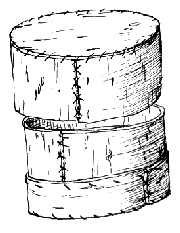
BEING QUILLED - [Schneider 1972]
Only a few Native Americans today
produce elaborately quilled items from birch bark. And on this
rare occasion these creations are quite dear to their maker, owing
to the amount of time and patience invested in each piece. On
a bark box only a few inches across there can be over 1,000 individual
quills!

| Round boxes were made by cutting two disks (the top and bottom of the box), each attached to a long rectangular piece forming the sides of the box. The lid is made with a slightly larger diameter to slip over the bottom half. Decorating with quills on the flat lids is done just before the pieces are stitched together, and more decoration could then be added to the sides of the cylinder. Afterwards, a backings of another layer of bark is inserted inside the box - the liners - one disk shaped to protect the quills of the lid and another rectangular piece is inserted against the inside of the side of the box to hold the lid-liner in place. Sometimes liners are additionally secured using a single long quill and the 'lattice stitch' in a large 'X' much like in a pattern much like sewing on a button. With the lattice stitch, the quills go through both the decorated piece and the backing layers of bark. |
|
CIRCULAR BARK BOX BEFORE BEING QUILLED - [Schneider 1972] |

| Oval, rectangular and other shaped boxes were produced in various sizes for items such as needles, gloves, cigars and cigarettes to appease the European market which developed in the late 1800's and early 1900's. [Schneider 1972, Miles 1963]. Some boxes were even shaped like the trunks of fur traders, or like European women's pocketbooks (Orchard 1984). Some of the most impressively decorated rectangular boxes are nearly a foot across and these fully-quilled boxes (like the ones made today by Ralph 'Porcupine' Bishop of Troy, Maine) have well over 10,000 quills! [Ripley, date unknown]. |
|
BARK CIGAR CASE FROM NATIVES OF THE FRENCH-CANADIAN AREA [Miles 1963] |

| North American Natives also decorated
more formal food containers, and occasionally personal items such
as headbands and pendants with porcupine quills. A 'meat dish
for deer's flesh' that had once been smeared with red ochre was
exhumed in 1827 from the burial of Beothuk chief in Newfoundland.
Secured just below the spruce-root wrapped rim is a layer of
bark decorated with quills in a chevron pattern [Reynolds 1978]. |
|
DETAIL OF MEAT DISH - BEOTHUK NATION[Reynolds 1978] |

| A headband made in the 1700's
probably by a Canadian Native, uses a combination of hide and
birch bark strips wrapped with quills. Although the quills are
wrapped around and not inserted through the bark, this headband
attests to the antiquity of using quills and birch bark together
[American Indian Art Magazine Summer 1993]. |
|
HEADBAND - Natvie Canadian [Amer. Ind. Art 1993] |

| A 4" case worn as a pendant
made in the early 1800's by a Native of the Red River area of
Manitoba uses quills stitched through the bark for surface decoration
as well as to lash the edges together [American Indian Art Magazine
Spring 1996]. |
|
CASE - Manitoba [Amer. Ind. Art 1996] |

|
Today smaller quilled products
are common, like this miniature bark canoe which I found at a
powwow in Franklin, Massachusetts - it has only four quills on
each side. Other 'souvenir' items, more quickly made with just
a few quills - even napkin rings - are made for todays (somewhat
unappreciative) commercial market. |

|
| NAPKIN RING - GREAT LAKES REGION [Hothem 1990] | CONTEMPORARY MINIATURE CANOE - MADE IN MAINE |
Porcupine Quillwork Bibliography and Books to Buy On-Line
Return to NativeTech's Main Porcupine Quillwork Menu

|
Text and Graphics
© 1994 - Tara Prindle unless otherwise cited. |